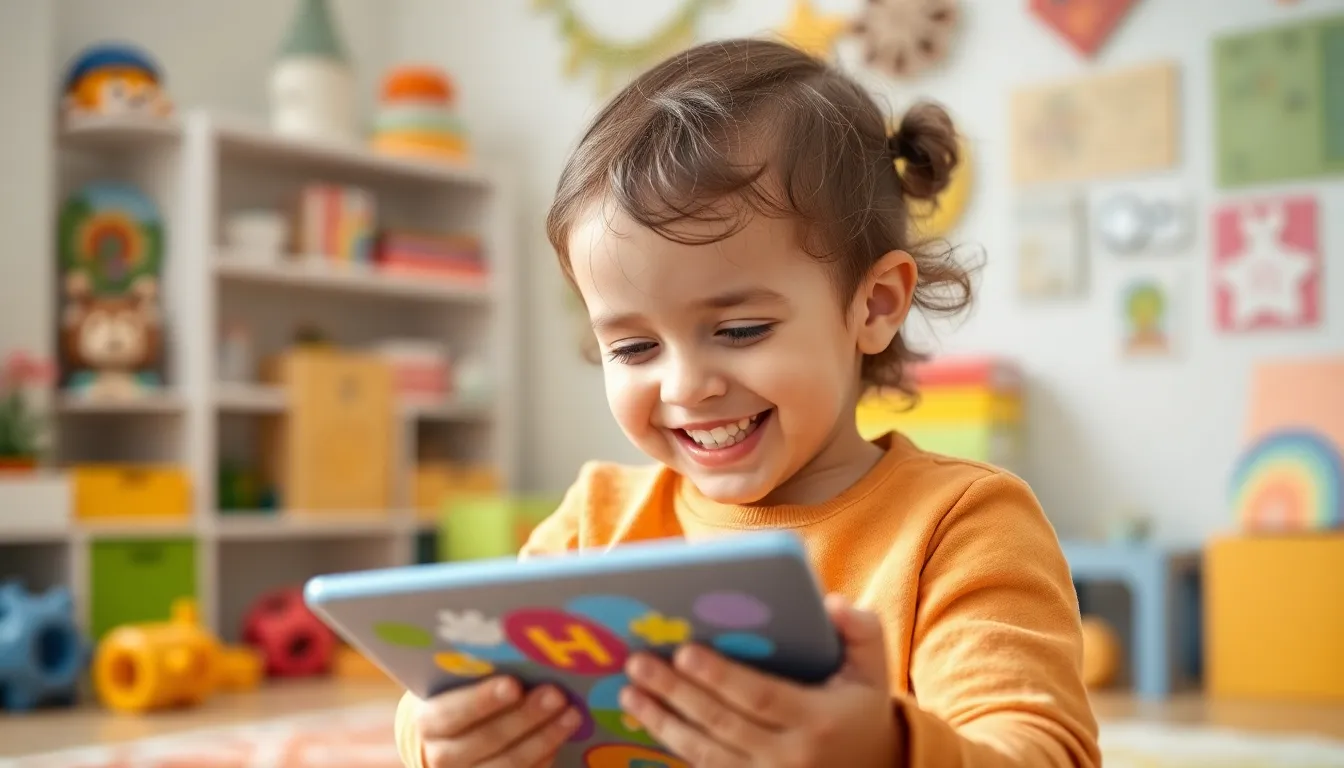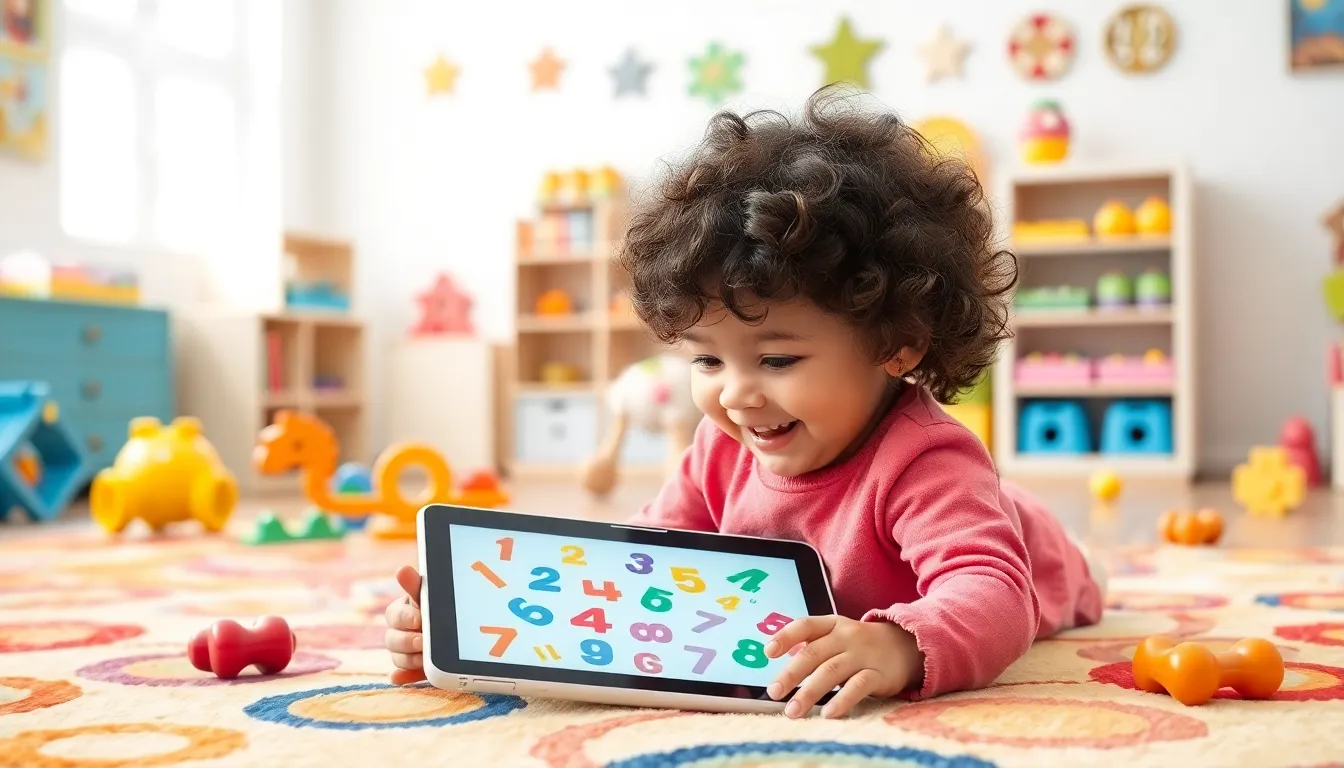In a world where toddlers can swipe before they can walk, finding the right apps for young learners is like searching for a needle in a haystack—if that needle could teach your kid math while making them giggle. Parents want educational tools that engage their little ones, and let’s face it, they need to be more fun than a trip to the dentist.
Table of Contents
ToggleOverview of Apps for Young Learners
Finding suitable apps for young learners requires a focus on both education and entertainment. Many resources now target toddlers with engaging content that enhances foundational skills. Parents can explore various categories, such as literacy and mathematics, designed specifically for younger audiences.
Educational apps often use interactive features to capture a child’s attention. For instance, programs that incorporate storytelling help develop language skills while keeping children entertained. Math apps utilize colorful visuals and games to make numbers exciting, which encourages early numeracy.
Research supports the idea that children benefit from interactive learning environments. Apps using a game-based approach can motivate learners to practice frequently, reinforcing concepts organically. Also, some apps foster creativity through art and music, allowing children to explore self-expression alongside their academic growth.
Language development apps include vocabulary games and reading challenges. These features introduce new words and foster comprehension. Math-focused apps typically involve counting and problem-solving tasks, creating a strong numerical foundation.
Safety remains a priority for parents. Many educational apps offer parental controls to monitor usage, ensuring a safe digital experience. Selecting apps with appropriate content ratings and user reviews helps parents make informed decisions.
Overall, a plethora of options exist that balance fun and education. Parents can find apps addressing specific developmental needs for their children, streamlining the search for tools that enrich learning experiences.
Key Features to Look For


When evaluating apps for young learners, specific features enhance both education and engagement. These elements play a crucial role in making the learning process both enjoyable and effective.
Educational Value
Focus on apps that offer clear educational outcomes. Look for content aligned with early learning standards that fosters skills in literacy, math, and critical thinking. Features like interactive quizzes and progress tracking provide valuable insights into a child’s development. Employing gamified elements keeps children motivated while reinforcing concepts. Research indicates that apps with a strong educational framework impact learning significantly, solidifying foundational skills in a fun way.
User-Friendly Interface
Prioritize apps with intuitive designs that young learners can navigate easily. A simple layout encourages exploration without frustration, promoting independent learning. Colorful visuals and engaging animations enhance excitement, drawing children into the app’s content. Clear instructions help them understand tasks swiftly, supporting user confidence. Ensuring accessibility for various devices, including tablets and smartphones, broadens usability. User-friendly interfaces enhance the overall learning experience and keep kids engaged longer.
Popular Apps for Young Learners
Several apps cater specifically to young learners, blending education with entertainment effectively. These applications enhance skills while engaging children during their learning journey.
Language Learning Apps
Language learning apps present innovative ways for children to develop communication skills. Programs like Duolingo Kids and Endless Alphabet incorporate interactive exercises and fun graphics to hold young learners’ attention. They support vocabulary building with engaging stories and playful characters. Features such as voice recognition help to improve pronunciation, making language acquisition enjoyable. Parents appreciate the progress tracking, allowing them to monitor skill development and adjust activities accordingly.
Math and Science Apps
Math and science apps provide interactive platforms for foundational learning. Apps like Prodigy Math and Toca Lab invite children to explore math concepts and scientific principles through games. Children can immerse themselves in problem-solving activities that adapt to their skill levels. Visual elements, such as animations, simplify complex ideas, fostering a deeper understanding of subjects. Educators endorse these apps for their alignment with educational standards, making them valuable tools for at-home learning.
Creative Arts Apps
Creative arts apps inspire self-expression and imaginative play among young learners. Platforms like Toca Hair Salon and Drawing Pad encourage children to explore artistic skills through creative projects. Young users can experiment with colors, shapes, and sounds, enhancing their creativity. The intuitive design fosters independent exploration, allowing children to play and learn at their own pace. Many parents find these apps essential in promoting artistic talents while supporting cognitive development.
Benefits of Using Apps for Young Learners
Educational apps for young learners provide numerous benefits that enhance their learning experiences. They promote interactivity, allowing children to engage actively with content rather than passively consuming it. Interactive features capture attention, which enhances motivation for repetitive practice and reinforces concepts effectively.
Skill development occurs through various activities incorporated in educational apps. Apps often include games, quizzes, and storytelling to foster literacy and numeracy. Children can explore mathematical concepts through engaging activities, which helps build their foundational skills while keeping them entertained.
Creativity thrives within these apps as well. Tools for art and music inspire self-expression and imaginative play, giving children opportunities to explore their artistic capabilities. Engaging with these creative apps supports both cognitive and emotional growth, enriching their overall development.
Safety stands out as a priority for parents when selecting apps. Many educational platforms include parental controls and content ratings, ensuring age-appropriate experiences for children. Such features provide peace of mind for parents, knowing their children explore a secure digital environment.
Additionally, apps can effectively align with early learning standards. Many educational apps incorporate progress tracking and interactive quizzes that help young learners advance in key areas. These components make it easy for parents to monitor their child’s skill development and adjust learning plans accordingly.
Diverse options exist in the realm of educational apps. With choices spanning language learning, math, science, and creative arts, parents can find applications tailored to their children’s individual preferences and learning needs. Balancing fun and education creates engaging experiences that benefit young learners.
Potential Drawbacks and Considerations
Finding the ideal educational app for young learners can present challenges. Some apps may excessively prioritize entertainment over educational content, leading to a dilution of learning objectives. Without a strong focus on skill development, children might not fully benefit from their screen time.
Screen time moderation also poses concerns. Experts recommend limiting screen exposure to prevent potential negative effects on young children’s attention spans and social skills. Parents often find balancing technology use with other activities difficult, especially if children become overly attached to their devices.
In-app purchases frequently emerge as another drawback. Many popular educational apps come with hidden costs that could surprise parents. While basic features may be free, additional content often requires payment, leading to unplanned expenses.
Privacy can become a serious consideration. Several educational apps collect data on users, raising concerns about children’s online safety. Parents must vet each app to ensure compliance with privacy standards and secure data handling practices.
Age appropriateness isn’t always well-defined. Not every app adequately targets the developmental stage of young learners. Consequently, children might engage with content that is too advanced or too simplistic, resulting in either frustration or boredom.
Additionally, some apps may lack clear instructional guidance. Without adequate support, children might struggle to navigate interfaces or purposefully engage with educational materials. Ideally, apps should offer tutorials or tips to facilitate learning experiences.
Lastly, diverse learning styles must be acknowledged. Not every child benefits from the same type of app. While some children thrive in interactive environments, others may require more hands-on approaches or one-on-one interaction, underscoring the need for a personalized learning strategy.


